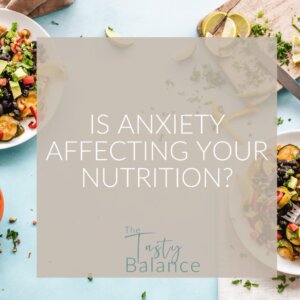Nutrition plays a crucial role in managing anxiety. While it’s important to acknowledge that food alone cannot completely resolve anxiety disorders, there is evidence suggesting that certain nutrients can influence mood, stress levels, and anxiety. Additionally, some foods may exacerbate anxiety symptoms.
Foods that Help Manage Anxiety: 
- Complex Carbohydrates: Foods like whole grains, beans, and legumes can increase serotonin production, promoting a calming effect.
- Foods Rich in Omega-3 Fatty Acids: Fatty fish (salmon, mackerel), flaxseeds, chia seeds, and walnuts are excellent sources. Omega-3s support brain health and can help reduce anxiety.
- Protein-rich foods: Lean meats, poultry, eggs, dairy, and plant-based sources like tofu or legumes provide amino acids that aid in neurotransmitter production for mood regulation.
- Fruits and Vegetables: Colorful produce contains antioxidants and vitamins that support overall brain health. Berries, spinach, kale, and other dark leafy greens are especially beneficial.
- Foods Rich in Magnesium: Magnesium-rich foods like almonds, cashews, spinach, and whole grains may help reduce anxiety symptoms. Magnesium supports neurotransmitter function.
- Probiotics: Fermented foods like yogurt, kefir, kimchi, and sauerkraut support gut health. The gut-brain connection suggests that a healthy gut can positively influence mental health.
Foods that Might Aggravate Anxiety:
- Caffeine: Found in coffee, tea, energy drinks, and some sodas, caffeine can increase heart rate and contribute to feelings of nervousness and agitation.
- Excessive Sugar: High sugar intake can lead to energy crashes and may exacerbate anxiety symptoms.
- Alcohol: While it might provide temporary relief, excessive alcohol consumption can disrupt neurotransmitters and worsen anxiety in the long term.
- Highly Processed Foods: Foods high in trans fats, artificial preservatives, and additives might negatively impact mood and overall mental health.
- High Sodium Foods: Excessive salt intake can increase blood pressure and impact stress levels.
In managing anxiety, it’s essential to maintain a balanced and varied diet, focusing on whole foods, adequate hydration, and regular mealtimes. Moreover, individual responses to food can vary, so it’s important to pay attention to how different foods affect your own anxiety levels. Seeking professional guidance from a healthcare provider or a registered dietitian is highly recommended to create a personalized nutrition plan that complements an overall treatment strategy for anxiety.




